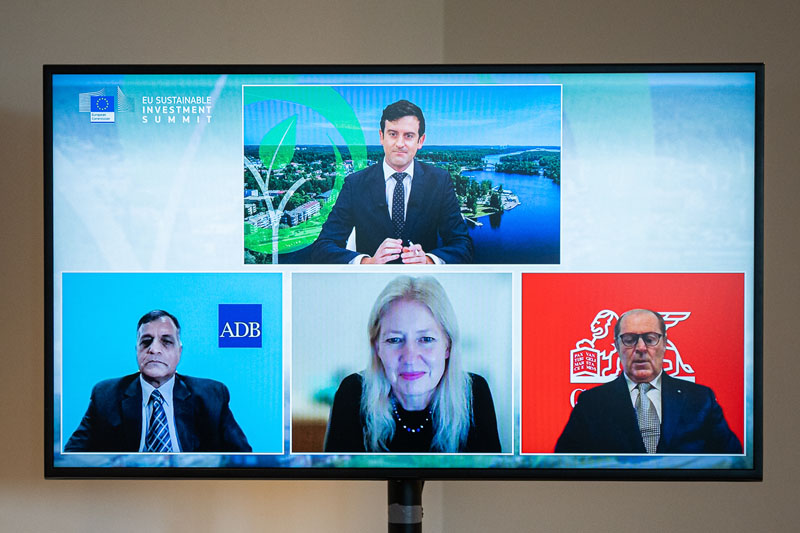PPPs and how to mobilise private investments for public goods and sustainable investment
In this Thematic Lunch Session, European Commission’s Spokesperson for banking and financial services Daniel Ferrie, moderated a discussion between co-panellists Ashok Lavasa: Vice-President for Private Sector Operations and Public-Private Partnerships at the Asian Development Bank (ADB); Philippe Donnet: Group CEO of Assicurazioni Generali S.p.A.; and Stephanie Pfeifer: CEO of the Institutional Investors Group on Climate Change (IGCC).

What are Public-Private Partnerships (PPPs)?
Public-Private Partnerships, explained Ashok Lavasa, “are long-term contractual arrangements between a public authority and a private partner, to deliver on public services and infrastructure. The private partner brings in the expertise and the capital needed to build the infrastructure or provide the public service. The public authority makes performance-based payments to the private partner for the provision of the services or grants the private partner a right to generate revenues from the provision of the services”.
Stephanie Pfeifer noted that “PPPs can be an excellent structure to attract private finance from investors looking for long term stable returns. The reasons that PPPs are relevant to this Summit is that they can be part of the solution to meeting sustainable finance goals. (…) Governments can really integrate climate change or other sustainability considerations into the procurement, evaluation, delivery and even the maintenance of the project, ensuring a whole lifecycle approach”.
How can PPPs mobilise the private investments really needed to reach our sustainable investment goals?
“Infrastructure investment in energy, transport, water and other areas is going to play an essential role in helping us achieve our climate and wider sustainable development goals. With countries experiencing fiscal and debt constraints, private capital is going to be critical in bridging that huge infrastructure investment gap”, explained Ms Pfeifer. “There has been a big shift in investor thinking, particularly over the last 18 months, with many more investors really considering the role they can play in supporting the transition to a net zero economy (…) [and] making commitments to align their portfolios to net zero and to invest in green solutions specifically”. But to attract private finance at scale, it is crucial to involve investors and companies from the start, to harness the experience and expertise of the private sector and “leverage it to the greatest extent possible to help create the much-needed solutions to solve these challenges”, said the IGCC CEO. Involving the EU institutions is equally important, as they can “provide expertise and co-financing”, as well as “help mitigate the political risk and some of the financial risk”.
Mr Lavasa added: “In the case of the European Green Deal, PPPs could be prioritised to help tackle societal challenges including climate change, new technological deployment, especially in energy and resource efficiency, sustainable transport and to boost digital innovation and security”.
These is no question that private investment crucial and the insurance sector is an area with a lot of potential in this regard. So what about investment companies, how do they see the role of Public-Private Partnerships?
Global challenges such as the COVID-19 pandemic or climate change, can only be addressed through public-private cooperation. For instance, SMEs were severely impacted by the pandemic, and insurance companies can offer a solution towards their recovery by co-investing in PPPs. However, says Philippe Donet, “we cannot build a global protection solution for SMEs during a pandemic situation without a strong cooperation at all levels between insurance companies, corporations but also with Member States and the EU. (…) We need good and sustainable projects on the one hand and money on the other”. The insurance sector can bring real added value, both in the volume of investment it can harness and in the speed of execution: “The total investment power of the insurance sector in Europe is 11 trillion euros. We should use part of this money to invest in the recovery. (…) We know how to channel capital into companies in a quick way”, said the Assicurazioni Generali Group CEO.
So, what next? What are the concrete actions to go forward?
Ashok Lavasa, Vice-President of the Asian development Bank said: “We are supporting the MCs to formulate robust long-term strategies and identify priority areas for private investment, as well as mechanisms to mobilise and channel private capital to the energy transition mechanisms, which will create opportunities for private capital to support our countries’ transition to clean energy. On the downstream side, we are developing regional climate bond markets by making anchor investments and to our own green bond issuance. We are also developing guarantee facilities to attract capital to small island countries at higher risk of climate change”.
Philippe Donnet, Group CEO of Assicurazioni Generali announced: the “Net Zero Insurance Alliance – the 8 largest insurance and re-insurance groups – committed to make their portfolios neutral in greenhouse gas emissions by 2050”.
Finally, Stephanie Pfeifer, CEO of the Institutional Investors Group on Climate Change pledged: “we are going to encourage investors to continue making their zero net commitments through the Paris aligned loans initiative and also develop, consult on and then publish an infrastructure component of our net zero investment framework; which will hopefully allow more infrastructure investors to make net zero commitments, to set targets and implement credible actions to line their portfolios with net zero”.
